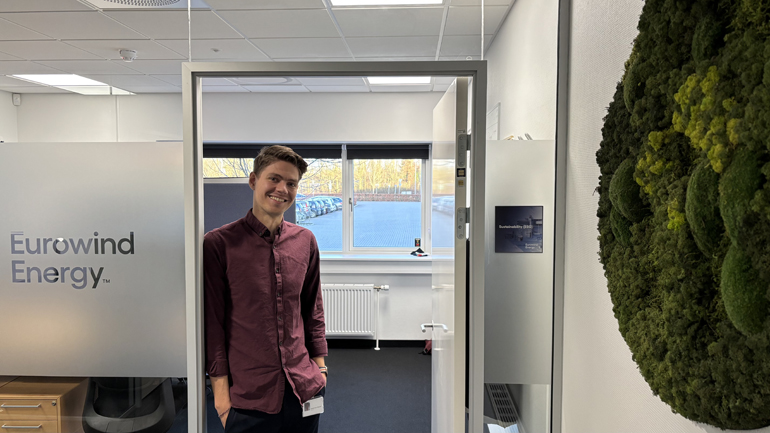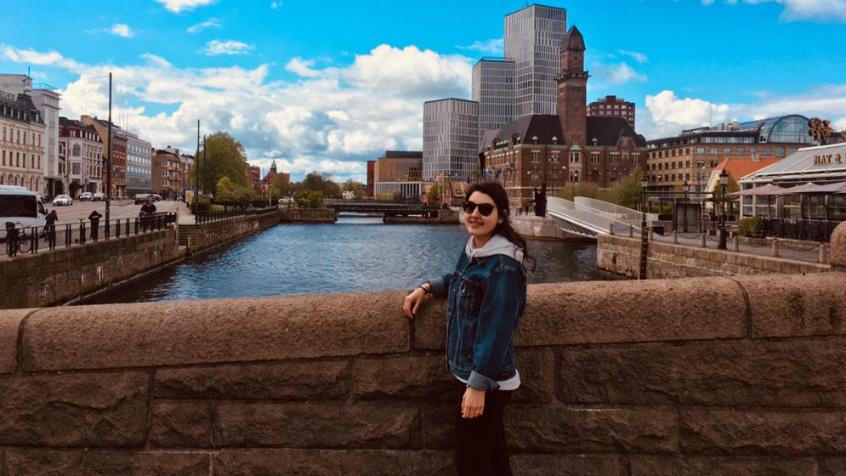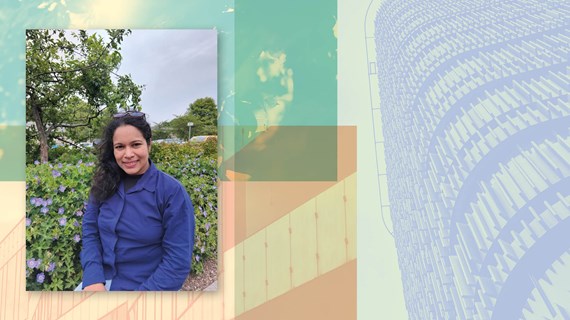Autumn 2025 - Semester 1
Spring 2026 - Semester 2
- Political Science: Thesis (ST632L), 15 credits
- Political Science: Social Science Methods for Global Politics (GP629L), 15 credits
I liked the fact that it is a multi-disciplinary programme which addresses aspects of international relations, human rights and peace and conflict studies. As the world is more interconnected than ever before, I think it is important to understand how social, economic and political transformations affect local and global governance.
Elina Natobidze-Airiian, alumni
The master´s programme Global Politics aims towards you who are interested in global political issues. You will learn how an increasingly complex world, where the global and the local meet, presents us with new challenges and opportunities. The programme provides you with a solid practical base concerning concepts like justice, peace, security, power, culture and democracy. You will learn how to analyse conflicts, international relations and human rights claims and violations.
This is a multi-disciplinary programme with a core of political science that addresses aspects of international relations, human rights and peace and conflict studies. The focus lays on the transformation of society, especially concerning the relationship between the state and other actors such as international organisations and companies.
Changes in political control, from reduced central control towards a greater degree of network control will also be addressed. You will analyse the growing importance of international norms, such as human rights. The emergence of other conflict patterns than those related to socio-economic resources (such as culture, ideology and religion) is important parts of the courses.
These are turbulent political times. International power bases are shifting. Political, economic and military threats merge and reform, presenting new political challenges. Examples from China and Russia prompt us to rethink the widely held belief that democratic reform will follow on the heels of economic progress.
With notions such as 'the war on terror” it is becoming more and more difficult to know what a war is, who fights it, how it starts and how it can end. In the meantime, global inequality is increasing. Half of the world’s population lives in severe poverty, many of them in conflict-ridden regions and/or under failing governments. Problems of development, such as malnutrition, poverty, and preventable diseases, can be solved by a global effort, so why does it not happen?
The one-year master's programme in Global Politics and Societal Change will help you make sense of these issues. It will give you a solid theoretical base concerning the meaning and role of concepts like justice, peace, security, power, culture and democracy.
The programme is thoroughly interdisciplinary and draws on our different strengths at the Department of Global Political studies, including within the fields of international relations, peace and conflict studies, human rights, public policy, as well as ethnography and philosophy.
The programme focuses specifically on the changing nature of global politics and pays particular attention to how new institutions and patterns of conflict and cooperation affect public policy on different levels, including the local level. In addition to advancing a more nuanced perspective on what ‘globalisation’ means, the programme extends students' understanding of politics as a continuous and often very complex interaction of decision-making, institutions, and advocacy on multiple levels.
After graduation, you will be prepared for qualified social scientific analysis. You will be well equipped to work with issues like international aid, development, conflict prevention, foreign policy, and human rights fulfilment. You will obtain relevant skills based on the latest research, combined with an ability to manage projects and communicate scientific knowledge to various social actors in the field.
Potential employers could be international agencies, non-governmental organisations, local and national administration agencies and the diplomatic service. You will also be able to go on to do a master's programme or PhD studies after completing your degree.
Here you can find the entry requirements, as well as how the available study places are distributed between applicants in the selection.
If you have any questions about general admission, you are welcome to contact us.
A Bachelor’s Degree within a social science field, e.g., Political Science, Peace and Conflict Studies, International Relations, Human Rights or a related major field. Equivalent of English 6 from Swedish secondary school.
100% University credits completed

Carsten Skov O’Donnell studied the one-year Global Politics Master’s programme. Today he works at Eurowind Energy in Denmark, a company that specialises in renewable energy parks.

Carsten Skov O’Donnell studied the one-year Global Politics Master’s programme. Today he works at Eurowind Energy in Denmark, a company that specialises in renewable energy parks.
“I’m part of a graduate rotation programme, which involves working in three different roles over two years, one of which is abroad. Currently, I’m in the ESG (Environmental, Social, and Governance) department, where I focus on preparing reports required by the EU’s Corporate Sustainability Reporting Directive. This involves gathering data and metrics related to environmental and human rights issues across our operations and value chains.”
“Right now, my main focus is ensuring compliance with the Directive. Although 2026 may seem far off, the scope of reporting required is vast and detailed. Much of my work involves retrieving data, coordinating with colleagues across departments, and setting up processes to meet the reporting requirements. While compliance is the primary goal, the work often drives broader organisational changes. For example, gaps identified in reporting sometimes lead to new policies or initiatives.”
“First, contributing to something meaningful. Working with renewable energy and sustainability feels rewarding. Second, I enjoy learning about the organisation as a whole. My role requires collaborating with people across different departments, which is both challenging and fulfilling.”
“I pursued a Master’s degree primarily because higher education is valued in Denmark and Sweden, where I wanted to settle. As for global politics, I was drawn to its flexibility. The programme allowed me to explore a wide range of topics which aligned with my interests in politics and sociology.”
“I particularly enjoyed a course on transnational policy and policy transfer. It introduced me to new theories and tools that reshaped how I approach global issues. Another memorable course explored internal colonialism, where I wrote an essay applying the concept to the Metaverse.”
“While my job isn’t directly related to global politics, the skills I developed in the programme are highly transferable. For example, the ability to analyse policies critically and evaluate their significance is crucial in my role. Additionally, the academic rigour required for my Master’s translates well into the due diligence processes I now manage in a corporate setting. My academic background demonstrated both my interest and knowledge of global and EU policies, which are central to my current role.”
“The classroom environment worked well, and everyone got along seamlessly. We had a very positive and collaborative dynamic. I was really happy that the programme was taught in English and welcomed international students. Initially, I assumed the class would mostly consist of Swedes and a smaller group of international students. However, I was pleasantly surprised to find it was much more diverse.”

Originally from the Netherlands, Elina Natobidze-Airiian moved to Sweden to study the master’s programme in political science. After graduating, she moved back to work for the Ministry of Health, Welfare and Sport in the Netherlands. Today she lives in Tbilisi, Georgia.

Originally from the Netherlands, Elina Natobidze-Airiian moved to Sweden to study the master’s programme in political science. After graduating, she moved back to work for the Ministry of Health, Welfare and Sport in the Netherlands. Today she lives in Tbilisi, Georgia.
"After doing some online research, I came across Malmö University and this particular programme, which immediately caught my attention. I liked the fact that it is a multi-disciplinary programme which addresses aspects of international relations, human rights and peace and conflict studies. As the world is more interconnected than ever before, I think it is important to understand how social, economic and political transformations affect local, national, European and global governance. Apart from that, political science graduates can work for a wide range of employers, such as the United Nations, the European Union, multinationals and NGOs."
"I really liked the fact that the programme has a good balance between lectures and seminars unlike many other master’s programmes. In this way, students are encouraged to participate in group discussions and ask the teacher questions. In addition, I appreciated the informal nature of Swedish society where students are free to think creatively and choose how to approach an assignment. I liked that the examination largely relied on doing your own research and academic writing rather than sit-in exams. There was also less emphasis on grades, which made studying less stressful and more enjoyable."
"After completing my bachelor’s programme I worked full-time for approximately a year. This break from studying gave me an opportunity to reflect on my goals. I realized that I really wanted to invest in my future and to pursue my interests in more depth. Also, I believe that having extra qualifications will make you stand out in the job market. Furthermore, it is a great way to build your network and to connect with likeminded people.
"In my opinion, the importance of studying at master’s level depends primarily on your career ambitions and your interests. A master in Political Science is more an in-depth study of the broader topics that are covered in a bachelor’s programme. Personally, I found it very interesting to pursue politics at a more advanced level. In addition, a master in political science has definitely improved my research and writing skills, which are required in many job positions."
"When I first arrived in Malmö, I felt at home right away. The flat landscape, the green areas and the many cycle routes felt pleasantly familiar to my home town in the Netherlands. Apart from that, Malmö is a very diverse and international city and you can easily communicate in English with people. Also, I was surprised by how well-organized, egalitarian and environmentally-conscious Sweden is. In addition, the public transportation works very well and can take you in less than 30 minutes to Copenhagen. Lastly, it is often said that Sweden has a reputation for being an expensive country. However, I believe that it is totally possible to find cheaper options in Malmö as well."

Chat with current student Amila Sanjeewanie Jayasinghe from the Political Science: Global Politics master's programme. Our ambassadors can answer questions regarding their programme, student life, and what it's like to study at Malmö University.